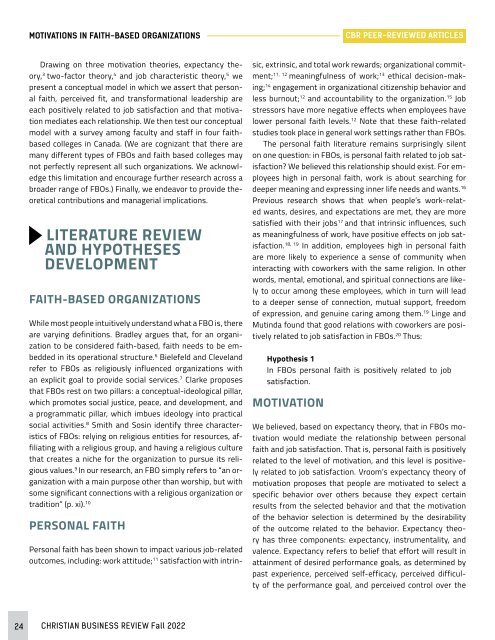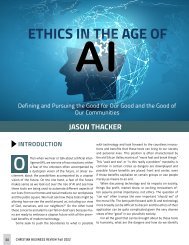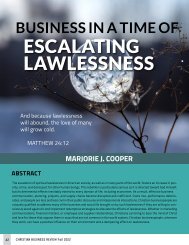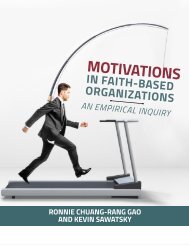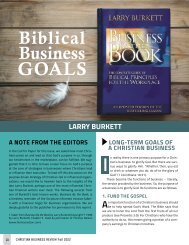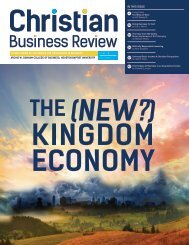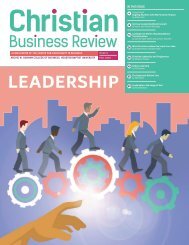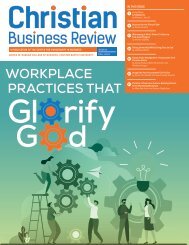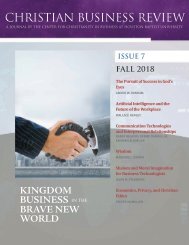Christian Business Review 2022: Pressing On Toward God's Goal
Create successful ePaper yourself
Turn your PDF publications into a flip-book with our unique Google optimized e-Paper software.
MOTIVATIONS IN FAITH-BASED ORGANIZATIONS<br />
CBR PEER-REVIEWED ARTICLES<br />
Drawing on three motivation theories, expectancy theory,<br />
3 two-factor theory, 4 and job characteristic theory, 5 we<br />
present a conceptual model in which we assert that personal<br />
faith, perceived fit, and transformational leadership are<br />
each positively related to job satisfaction and that motivation<br />
mediates each relationship. We then test our conceptual<br />
model with a survey among faculty and staff in four faithbased<br />
colleges in Canada. (We are cognizant that there are<br />
many different types of FBOs and faith based colleges may<br />
not perfectly represent all such organizations. We acknowledge<br />
this limitation and encourage further research across a<br />
broader range of FBOs.) Finally, we endeavor to provide theoretical<br />
contributions and managerial implications.<br />
LITERATURE REVIEW<br />
AND HYPOTHESES<br />
DEVELOPMENT<br />
FAITH-BASED ORGANIZATIONS<br />
While most people intuitively understand what a FBO is, there<br />
are varying definitions. Bradley argues that, for an organization<br />
to be considered faith-based, faith needs to be embedded<br />
in its operational structure. 6 Bielefeld and Cleveland<br />
refer to FBOs as religiously influenced organizations with<br />
an explicit goal to provide social services. 7 Clarke proposes<br />
that FBOs rest on two pillars: a conceptual-ideological pillar,<br />
which promotes social justice, peace, and development, and<br />
a programmatic pillar, which imbues ideology into practical<br />
social activities. 8 Smith and Sosin identify three characteristics<br />
of FBOs: relying on religious entities for resources, affiliating<br />
with a religious group, and having a religious culture<br />
that creates a niche for the organization to pursue its religious<br />
values. 9 In our research, an FBO simply refers to “an organization<br />
with a main purpose other than worship, but with<br />
some significant connections with a religious organization or<br />
tradition” (p. xi). 10<br />
PERSONAL FAITH<br />
Personal faith has been shown to impact various job-related<br />
outcomes, including: work attitude; 11 satisfaction with intrinsic,<br />
extrinsic, and total work rewards; organizational commitment;<br />
11, 12 meaningfulness of work; 13 ethical decision-making;<br />
14 engagement in organizational citizenship behavior and<br />
less burnout; 12 and accountability to the organization. 15 Job<br />
stressors have more negative effects when employees have<br />
lower personal faith levels. 12 Note that these faith-related<br />
studies took place in general work settings rather than FBOs.<br />
The personal faith literature remains surprisingly silent<br />
on one question: in FBOs, is personal faith related to job satisfaction?<br />
We believed this relationship should exist. For employees<br />
high in personal faith, work is about searching for<br />
deeper meaning and expressing inner life needs and wants. 16<br />
Previous research shows that when people’s work-related<br />
wants, desires, and expectations are met, they are more<br />
satisfied with their jobs 17 and that intrinsic influences, such<br />
as meaningfulness of work, have positive effects on job satisfaction.<br />
18, 19 In addition, employees high in personal faith<br />
are more likely to experience a sense of community when<br />
interacting with coworkers with the same religion. In other<br />
words, mental, emotional, and spiritual connections are likely<br />
to occur among these employees, which in turn will lead<br />
to a deeper sense of connection, mutual support, freedom<br />
of expression, and genuine caring among them. 19 Linge and<br />
Mutinda found that good relations with coworkers are positively<br />
related to job satisfaction in FBOs. 20 Thus:<br />
Hypothesis 1<br />
In FBOs personal faith is positively related to job<br />
satisfaction.<br />
MOTIVATION<br />
We believed, based on expectancy theory, that in FBOs motivation<br />
would mediate the relationship between personal<br />
faith and job satisfaction. That is, personal faith is positively<br />
related to the level of motivation, and this level is positively<br />
related to job satisfaction. Vroom’s expectancy theory of<br />
motivation proposes that people are motivated to select a<br />
specific behavior over others because they expect certain<br />
results from the selected behavior and that the motivation<br />
of the behavior selection is determined by the desirability<br />
of the outcome related to the behavior. Expectancy theory<br />
has three components: expectancy, instrumentality, and<br />
valence. Expectancy refers to belief that effort will result in<br />
attainment of desired performance goals, as determined by<br />
past experience, perceived self-efficacy, perceived difficulty<br />
of the performance goal, and perceived control over the<br />
24<br />
CHRISTIAN BUSINESS REVIEW Fall <strong>2022</strong>


